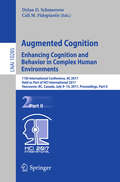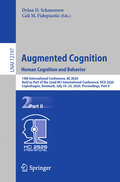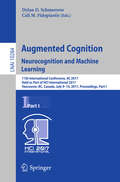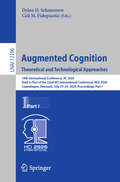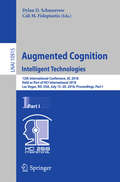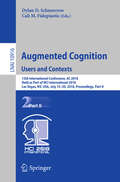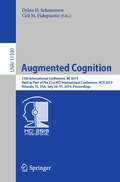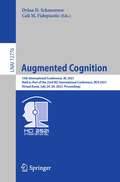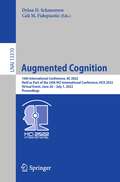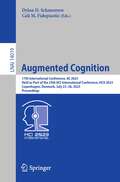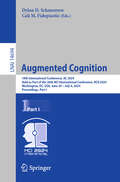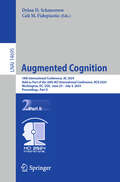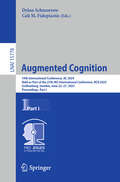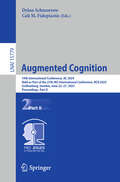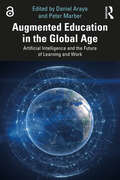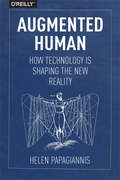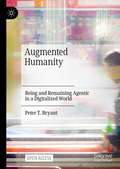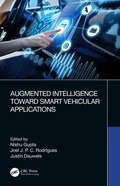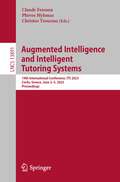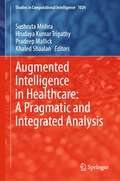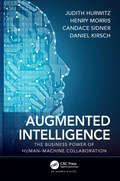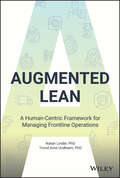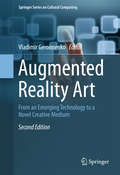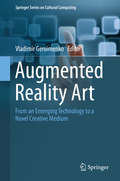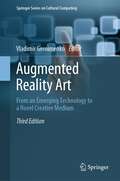- Table View
- List View
Augmented Cognition. Enhancing Cognition and Behavior in Complex Human Environments: 11th International Conference, AC 2017, Held as Part of HCI International 2017, Vancouver, BC, Canada, July 9-14, 2017, Proceedings, Part II (Lecture Notes in Computer Science #10285)
by Dylan D. Schmorrow Cali M. FidopiastisThis volume constitutes the proceedings of the 11th International Conference on Augmented Cognition, AC 2017, held as part of the International Conference on Human-Computer Interaction, HCII 2017, which took place in Vancouver, BC, Canada, in July 2017. HCII 2017 received a total of 4340 submissions, of which 1228 papers were accepted for publication after a careful reviewing process. The papers thoroughly cover the entire field of Human-Computer Interaction, addressing major advances in knowledge and effective use of computers in a variety of application areas. The two volumes set of AC 2017 presents 81 papers which are organized in the following topical sections: electroencephalography and brain activity measurement, eye tracking in augmented cognition, physiological measuring and bio-sensing, machine learning in augmented cognition, cognitive load and performance, adaptive learning systems, brain-computer interfaces, human cognition and behavior in complex tasks and environments.
Augmented Cognition. Human Cognition and Behavior: 14th International Conference, AC 2020, Held as Part of the 22nd HCI International Conference, HCII 2020, Copenhagen, Denmark, July 19–24, 2020, Proceedings, Part II (Lecture Notes in Computer Science #12197)
by Dylan D. Schmorrow Cali M. FidopiastisThis book constitutes the refereed proceedings of 14th International Conference on Augmented Cognition, AC 2020, held as part of the 22nd International Conference on Human-Computer Interaction, HCII 2020, in July 2020. The conference was planned to be held in Copenhagen, Denmark, but had to change to a virtual conference mode due to the COVID-19 pandemic.From a total of 6326 submissions, a total of 1439 papers and 238 posters has been accepted for publication in the HCII 2020 proceedings. The 21 papers presented in this volume were organized in topical sections as follows: cognitive modeling, perception, emotion and interaction; electroencephalography and BCI; and AI and augmented cognition.
Augmented Cognition. Neurocognition and Machine Learning: 11th International Conference, AC 2017, Held as Part of HCI International 2017, Vancouver, BC, Canada, July 9-14, 2017, Proceedings, Part I (Lecture Notes in Computer Science #10284)
by Dylan D. Schmorrow Cali M. FidopiastisThis volume constitutes the proceedings of the 11th International Conference on Augmented Cognition, AC 2017, held as part of the International Conference on Human-Computer Interaction, HCII 2017, which took place in Vancouver, BC, Canada, in July 2017. HCII 2017 received a total of 4340 submissions, of which 1228 papers were accepted for publication after a careful reviewing process. The papers thoroughly cover the entire field of Human-Computer Interaction, addressing major advances in knowledge and effective use of computers in a variety of application areas. The two volumes set of AC 2017 presents 81 papers which are organized in the following topical sections: electroencephalography and brain activity measurement, eye tracking in augmented cognition, physiological measuring and bio-sensing, machine learning in augmented cognition, cognitive load and performance, adaptive learning systems, brain-computer interfaces, human cognition and behavior in complex tasks and environments.
Augmented Cognition. Theoretical and Technological Approaches: 14th International Conference, AC 2020, Held as Part of the 22nd HCI International Conference, HCII 2020, Copenhagen, Denmark, July 19–24, 2020, Proceedings, Part I (Lecture Notes in Computer Science #12196)
by Dylan D. Schmorrow Cali M. FidopiastisThis book constitutes the refereed proceedings of 14th International Conference on Augmented Cognition, AC 2020, held as part of the 22nd International Conference on Human-Computer Interaction, HCII 2020, in July 2020. The conference was planned to be held in Copenhagen, Denmark, but had to change to a virtual conference mode due to the COVID-19 pandemic.From a total of 6326 submissions, a total of 1439 papers and 238 posters has been accepted for publication in the HCII 2020 proceedings. The 21 papers presented in this volume were organized in topical sections as follows: cognitive modeling, perception, emotion and interaction; electroencephalography and BCI; and AI and augmented cognition.
Augmented Cognition: 12th International Conference, AC 2018, Held as Part of HCI International 2018, Las Vegas, NV, USA, July 15-20, 2018, Proceedings, Part I (Lecture Notes in Computer Science #10915)
by Dylan D. Schmorrow Cali M. FidopiastisThis two-volume set LNCS 10915 and 10916 constitutes the refereed proceedings of the 12h International Conference on Augmented Cognition, AC 2018, held as part of the 20th International Conference on Human-Computer Interaction, HCII 2018, in Las Vegas, NV, USA in July 2018. The 1171 papers presented at HCII 2018 conferences were carefully reviewed and selected from 4346 submissions.The papers cover the entire field of human-computer interaction, addressing major advances in knowledge and effective use of computers in a variety of applications areas. The papers in this volume are organized in the following topical sections: context aware adaption strategies in augmented cognition, brain sensors and measures for operational environments, artificial intelligence and machine learning in augmented cognition, augmented cognition in virtual and mixed reality.
Augmented Cognition: 12th International Conference, AC 2018, Held as Part of HCI International 2018, Las Vegas, NV, USA, July 15-20, 2018, Proceedings, Part II (Lecture Notes in Computer Science #10916)
by Dylan D. Schmorrow Cali M. FidopiastisThis two-volume set LNCS 10915 and 10916 constitutes the refereed proceedings of the 12h International Conference on Augmented Cognition, AC 2018, held as part of the 20th International Conference on Human-Computer Interaction, HCII 2018, in Las Vegas, NV, USA in July 2018. The 1171 papers presented at HCII 2018 conferences were carefully reviewed and selected from 4346 submissions. The papers cover the entire field of human-computer interaction, addressing major advances in knowledge and effective use of computers in a variety of applications areas. The papers in this volume are organized in the following topical sections:Cognitive modeling, perception, emotion and interaction, augmented learning and training, shared cognition, team performance and decision-making.
Augmented Cognition: 13th International Conference, AC 2019, Held as Part of the 21st HCI International Conference, HCII 2019, Orlando, FL, USA, July 26–31, 2019, Proceedings (Lecture Notes in Computer Science #11580)
by Dylan D. Schmorrow Cali M. FidopiastisThis book constitutes the refereed proceedings of the 13th International Conference on Augmented Cognition, AC 2019, held as part of the 21st International Conference on Human-Computer Interaction, HCII 2019, in Orlando, FL, USA in July, 2019. The 1274 full papers and 209 posters presented at the HCII 2019 conferences were carefully reviewed and selected from 5029 submissions. The papers cover the entire field of human-computer interaction, addressing major advances in knowledge and effective use of computers in a variety of applications areas. The papers in this volume are organized in the following topical sections: cognitive modeling, perception, emotion and interaction; human cognition and behavior in complex tasks and environments; brain-computer interfaces and electroencephalography; and augmented learning.
Augmented Cognition: 15th International Conference, AC 2021, Held as Part of the 23rd HCI International Conference, HCII 2021, Virtual Event, July 24–29, 2021, Proceedings (Lecture Notes in Computer Science #12776)
by Dylan D. Schmorrow Cali M. FidopiastisThis book constitutes the proceedings of the 15th International Conference on Augmented Cognition, AC 2021, held as part of the 23rd International Conference, HCI International 2020, held as a virtual event, in July 2021. The total of 1276 papers and 241 posters included in the 36 HCII 2021 proceedings volumes was carefully reviewed and selected from 5222 submissions.AC 2021 includes a total of 32 regular papers; they were organized in topical sections named: BCI and brain activity measurement physiological measuring and human performance; modelling human cognition; and augmented cognition in complex environments.
Augmented Cognition: 16th International Conference, AC 2022, Held as Part of the 24th HCI International Conference, HCII 2022, Virtual Event, June 26 – July 1, 2022, Proceedings (Lecture Notes in Computer Science #13310)
by Dylan D. Schmorrow Cali M. FidopiastisThis book constitutes the refereed proceedings of the 16th International Conference on Augmented Cognition, AC 2022, held as part of the 23rd International Conference, HCI International 2022, which was held virtually in June/July 2022.The total of 1271 papers and 275 posters included in the HCII 2022 proceedings was carefully reviewed and selected from 5487 submissions. The AC 2022 proceedings aims to develop adaptive systems capable of extending the information management capacity of individuals through computing technologies and offers a broad range of theoretical and applied issues related to Augmented Cognition and its applications.
Augmented Cognition: 17th International Conference, AC 2023, Held as Part of the 25th HCI International Conference, HCII 2023, Copenhagen, Denmark, July 23–28, 2023, Proceedings (Lecture Notes in Computer Science #14019)
by Dylan D. Schmorrow Cali M. FidopiastisThis book constitutes the refereed proceedings of 17th International Conference, AC 2023, held as part of the 25th International Conference, HCI International 2023, which was held virtually in Copenhagen, Denmark in July 2023. The total of 1578 papers and 396 posters included in the HCII 2023 proceedings was carefully reviewed and selected from 7472 submissions. The AC 2023 conference focuses on topics related to Brain-Computer Interfaces and neurotechnology; neuroergonomics, physiological measurements, and human performance; evolving theory and practice of AC; Augmented and Virtual Reality for AC; as well as understanding human cognition and performance in IT security.
Augmented Cognition: 18th International Conference, AC 2024, Held as Part of the 26th HCI International Conference, HCII 2024, Washington, DC, USA, June 29–July 4, 2024, Proceedings, Part I (Lecture Notes in Computer Science #14694)
by Dylan D. Schmorrow Cali M. FidopiastisThis book constitutes the refereed proceedings of the 18th International Conference on Augmented Cognition, AC 2024, held as part of the 26th HCI International Conference, HCII 2024, which took place in Washington, DC, USA, during June 29–July 4, 2024. The total of 1271 papers and 309 posters included in the HCII 2024 proceedings was carefully reviewed and selected from 5108 submissions. The AC 2024 proceedings were organized in the following topical sections: Part I: Understanding cognitive processes and human performance; advancing cognitive abilities and performance with augmented tools; Part II: Advances in augmented cognition technologies; applications of augmented cognition in various contexts.
Augmented Cognition: 18th International Conference, AC 2024, Held as Part of the 26th HCI International Conference, HCII 2024, Washington, DC, USA, June 29–July 4, 2024, Proceedings, Part II (Lecture Notes in Computer Science #14695)
by Dylan D. Schmorrow Cali M. FidopiastisThis book constitutes the refereed proceedings of the 18th International Conference on Augmented Cognition, AC 2024, held as part of the 26th HCI International Conference, HCII 2024, which took place in Washington, DC, USA, during June 29–July 4, 2024. The total of 1271 papers and 309 posters included in the HCII 2024 proceedings was carefully reviewed and selected from 5108 submissions. The AC 2024 proceedings were organized in the following topical sections: Part I: Understanding cognitive processes and human performance; advancing cognitive abilities and performance with augmented tools; Part II: Advances in augmented cognition technologies; applications of augmented cognition in various contexts.
Augmented Cognition: 19th International Conference, AC 2025, Held as Part of the 27th HCI International Conference, HCII 2025, Gothenburg, Sweden, June 22–27, 2025, Proceedings, Part I (Lecture Notes in Computer Science #15778)
by Dylan D. Schmorrow Cali M. FidopiastisThe two volume set LNAI 15778 and LNAI 15779 constitutes the refereed proceedings of the 19th International Conference on Augmented Cognition, AC 2025, held as part of the 27th HCI International Conference, HCII 2025, which took place in Gothenburg, Sweden, June 22–27, 2025. The total of 1430 papers and 355 posters included in the HCII 2025 proceedings was carefully reviewed and selected from 7972 submissions. The papers have been organized in topical sections as follows: Part I: Neurotechnology and eye tracking in augmented cognition; augmented cognitiona dn user experience; Part II: Emotions in augmented cognition; enhancing learning and memory.
Augmented Cognition: 19th International Conference, AC 2025, Held as Part of the 27th HCI International Conference, HCII 2025, Gothenburg, Sweden, June 22–27, 2025, Proceedings, Part II (Lecture Notes in Computer Science #15779)
by Dylan D. Schmorrow Cali M. FidopiastisThe two volume set LNAI 15778 and LNAI 15779 constitutes the refereed proceedings of the 19th International Conference on Augmented Cognition, AC 2025, held as part of the 27th HCI International Conference, HCII 2025, which took place in Gothenburg, Sweden, June 22–27, 2025. The total of 1430 papers and 355 posters included in the HCII 2025 proceedings was carefully reviewed and selected from 7972 submissions. The papers have been organized in topical sections as follows: Part I: Neurotechnology and eye tracking in augmented cognition; augmented cognitiona dn user experience; Part II: Emotions in augmented cognition; enhancing learning and memory.
Augmented Education in the Global Age: Artificial Intelligence and the Future of Learning and Work
by Peter Marber Daniel ArayaAugmented Education in the Global Age: Artificial Intelligence and the Future of Learning and Work is an edited collection that explores the social impact of Artificial Intelligence over the coming decades, specifically how this emerging technology will transform and disrupt our contemporary institutions. Chapters in this book discuss the history of technological revolutions and consider the anxieties and social challenges of lost occupations, as well as the evolution of new industries overlapping robotics, biotechnology, space exploration, and clean energy. Chapter authors unpack the nature of augmented education, from revamping curriculum and personalizing education, to redesigning workplace learning for an algorithmic era. Ultimately the book discusses policy and planning for an augmented future, arguing that work and learning are undergoing a metamorphosis around creativity and innovation amid a new global era and the race against automating technologies. Bringing together expert perspectives from around the world, this exciting, informative collection of research and analysis helps educators, policymakers and analysts navigate the future of work and learning amid rapid and accelerating technological change. The Open Access version of this book, available at http://www.taylorfrancis.com, has been made available under a Creative Commons Attribution-Non Commercial-No Derivatives (CC-BY-NC-ND) 4.0 license.
Augmented Human: How Technology Is Shaping the New Reality
by Helen PapagiannisAugmented Reality (AR) blurs the boundary between the physical and digital worlds. In AR’s current exploration phase, innovators are beginning to create compelling and contextually rich applications that enhance a user’s everyday experiences. In this book, Dr. Helen Papagiannis—a world-leading expert in the field—introduces you to AR: how it’s evolving, where the opportunities are, and where it’s headed.If you’re a designer, developer, entrepreneur, student, educator, business leader, artist, or simply curious about AR’s possibilities, this insightful guide explains how you can become involved with an exciting, fast-moving technology.You’ll explore how:Computer vision, machine learning, cameras, sensors, and wearables change the way you see the worldHaptic technology syncs what you see with how something feelsAugmented sound and hearables alter the way you listen to your environmentDigital smell and taste augment the way you share and receive informationNew approaches to storytelling immerse and engage users more deeplyUsers can augment their bodies with electronic textiles, embedded technology, and brain-controlled interfacesHuman avatars can learn our behaviors and act on our behalf
Augmented Humanity: Being and Remaining Agentic in a Digitalized World
by Peter T. BryantThis open access book will examine the implications of digitalization for the understanding of humanity, conceived as a community of intelligent agency. It addresses important topics across a range of social and behavioral theories and identifies a range of novel mechanisms and their social behavioral effects. Across the book, the author highlights the expansion of intelligent processing capability brought about by digitalization and the challenges this exposes for integrating artificial and human capabilities. It includes the altered effects of bounded rationality in problem solving and decision making; related changes in the perception of rationality, plus novel myopias and biases. It also seeks to address cognitive intersubjectivity, learning from performance and agentic self-generation; and the novel methods and patterns of reasoned thought which emerge in a digitalized world; and how these mechanisms will combine in making and remaking the world of human experience and understanding. This book examines the problematics and prospects for digitally augmented humanity. In doing so, it maps the terrain for a future science of augmented agency. It will have cross-disciplinary appeal to students and scholars of applied psychology, cognitive and behavioral science, organizational psychology and management, business, finance, and digital cultures and humanities.
Augmented Intelligence Toward Smart Vehicular Applications
by Nishu Gupta, Joel J. P. C. Rodrigues, and Justin DauwelsThis up-to-date reference text discusses important concepts of vehicular communication in intelligent transportation systems. The text begins by discussing the key objectives of intelligent transport systems and Vehicular ad-hoc networks (VANETs). It then goes on to discuss challenges, applications, and future trends in Vehicular ad-hoc networks. The text focuses on the organization of Artificial Intelligence (AI) and aspects of deep learning algorithms, particularly multimodal transport. The text will serve as an ideal reference for graduate students and academic researchers in the field of electrical engineering, electronics and communication engineering, and transportation engineering.
Augmented Intelligence and Intelligent Tutoring Systems: 19th International Conference, ITS 2023, Corfu, Greece, June 2–5, 2023, Proceedings (Lecture Notes in Computer Science #13891)
by Claude Frasson Phivos Mylonas Christos TroussasThis book constitutes the refereed proceedings of the 19th International Conference on Augmented Intelligence and Intelligent Tutoring Systems, ITS 2023, held in Corfu, Greece, during June 2-5, 2023. The 41 full papers and 19 short papers presented in this book were carefully reviewed and selected from 84 submissions. The papers are divided into the following topical sections: augmented intelligence in tutoring systems; augmented intelligence in healthcare informatics; augmented intelligence in games, serious games and virtual reality; neural networks and data mining; augmented intelligence and metaverse; security, privacy and ethics in augmented intelligence; and applied natural language processing.
Augmented Intelligence in Healthcare: A Pragmatic and Integrated Analysis (Studies in Computational Intelligence #1024)
by Khaled Shaalan Hrudaya Kumar Tripathy Sushruta Mishra Pradeep MallickThe book discusses how augmented intelligence can increase the efficiency and speed of diagnosis in healthcare organizations. The concept of augmented intelligence can reflect the enhanced capabilities of human decision-making in clinical settings when augmented with computation systems and methods. It includes real-life case studies highlighting impact of augmented intelligence in health care. The book offers a guided tour of computational intelligence algorithms, architecture design, and applications of learning in healthcare challenges. It presents a variety of techniques designed to represent, enhance, and empower multi-disciplinary and multi-institutional machine learning research in healthcare informatics. It also presents specific applications of augmented intelligence in health care, and architectural models and frameworks-based augmented solutions.
Augmented Intelligence: The Business Power of Human–Machine Collaboration
by Henry Morris Judith Hurwitz Candace Sidner Daniel KirschThe AI revolution is moving at a breakneck speed. Organizations are beginning to invest in innovative ways to monetize their data through the use of artificial intelligence. Businesses need to understand the reality of AI. To be successful, it is imperative that organizations understand that augmented intelligence is the secret to success. Augmented Intelligence: The Business Power of Human–Machine Collaboration is about the process of combining human and machine intelligence. This book provides business leaders and AI data experts with an understanding of the value of augmented intelligence and its ability to help win competitive markets. This book focuses on the requirement to clearly manage the foundational data used for augmented intelligence. It focuses on the risks of improper data use and delves into the ethics and governance of data in the era of augmented intelligence. In this book, we explore the difference between weak augmentation that is based on automating well understood processes and strong augmentation that is designed to rethink business processes through the inclusion of data, AI and machine learning. What experts are saying about Augmented Intelligence "The book you are about to read is of great importance because we increasingly rely on machine learning and AI. Therefore, it is critical that we understand the ability to create an environment in which businesses can have the tools to understand data from a holistic perspective. What is imperative is to be able to make better decisions based on an understanding of the behavior and thinking of our customers so that we can take the best next action. This book provides a clear understanding of the impact of augmented intelligence on both society and business."—Tsvi Gal, Managing Director, Enterprise Technology and Services, Morgan Stanley "Our mission has always been to help clients apply AI to better predict and shape future outcomes, empower higher value work, and automate how work gets done. I have always said, ’AI will not replace managers, but managers who use AI will replace managers who don't.’ This book delves into the real value that AI promises, to augment existing human intelligence, and in the process, dispels some of the myths around AI and its intended purpose."—Rob Thomas, General Manager, Data and AI, IBM
Augmented Lean: A Human-Centric Framework for Managing Frontline Operations
by Trond Arne Undheim Natan LinderExplore the real future of work in this expert tech implementation guide that goes beyond automation In Augmented Lean: A Human-Centric Framework for Managing Frontline Operations, serial startup founder Dr. Natan Linder and futurist podcaster Dr. Trond Arne Undheim deliver an urgent and incisive exploration of how to facilitate agile processes amongst a millennial workforce that already lives by many of its tenets. The book demonstrates how to abandon legacy industrial technology that is failing modern operations and hindering operational excellence and digital progress. As an executive and leader, you cannot fall prey to hyped-up notions of industry 4.0's factory of the future automation, artificial intelligence, internet of things, sensors, digital twins, and augmented reality fixing every problem. Instead, to truly reduce cognitive load, complexity, and frustrations in the workplace, we must build cyber-physical technologies so that humans remain at the center. Leaders must ensure that the technology they deploy at an industrial scale has fluid interfaces that demonstrably simplifies work and makes operations more flexible without introducing fear, uncertainty, or doubt. The authors provide: A step-by-step walkthrough of the Augmented Lean framework that shows readers when, how, and why to augment your workforce through cyber-physical principles that go beyond both Lean and Agile management practices Concrete strategies on how to scale these operational augmentation methods throughout your organization based on real-world case studies of operators in the trenches of manufacturing whose impact far outweighs their seniority in the corporate hierarchy Insightful advice for how to use the augmentation framework in small- and medium-sized enterprises where license and training costs are prohibitive when only using off-the-shelf industry 4.0 approaches A thoroughly practical playbook for augmenting your workforce with the latest cyber-physical adaptations to digital technologies, Augmented Lean provides you with the organizational-, process-, and management-level techniques you need to get the most out of your employees. In turn, as an operator, engineer, or industrial worker reading this book, you will become empowered to be a change agent through no-code interfaces instead of remaining a recipient of endless training demands and ever-increasing technological complexity. Augmented Lean will orient you towards the future with the most effective tools to cut through hype so you can instantly apply your learnings and be productive wherever you currently operate.
Augmented Reality Art: From An Emerging Technology To A Novel Creative Medium (Springer Series on Cultural Computing)
by Vladimir GeroimenkoThis is the second edition of the first ever book to explore the exciting new field of augmented reality art and its enabling technologies. The new edition has been thoroughly revised and updated, and contains 5 new chapters. As well as investigating augmented reality as a novel artistic medium the book covers cultural, social, spatial and cognitive facets of augmented reality art. Intended as a starting point for exploring this new fascinating area of research and creative practice it will be essential reading not only for artists, researchers and technology developers, but also for students (graduates and undergraduates) and all those interested in emerging augmented reality technology and its current and future applications in art.
Augmented Reality Art: From an Emerging Technology to a Novel Creative Medium (Springer Series on Cultural Computing)
by Vladimir GeroimenkoThis is the first ever book on augmented reality art. It is written by a team of world-leading artists, researchers and practitioners, pioneering in the use of augmented reality technology as a novel artistic medium. The book explores a wide range of major aspects of augmented reality art and its enabling technology. It is intended to be a starting point and essential reading not only for artists, researchers and technology developers, but also for students (both graduates and undergraduates) and everyone who is interested in emerging augmented reality technology and its current and future applications in art.
Augmented Reality Art: From an Emerging Technology to a Novel Creative Medium (Springer Series on Cultural Computing)
by Vladimir GeroimenkoThis is the third edition of the first ever book to explore the exciting field of augmented reality art and its enabling technologies. The new edition has been thoroughly revised and updated, with 9 new chapters included. As well as investigating augmented reality as a novel artistic medium, the book covers cultural, social, spatial and cognitive facets of augmented reality art. It has been written by a virtual team of 33 researchers and artists from 11 countries who are pioneering in the new form of art, and contains numerous colour illustrations showing both classic and recent augmented reality artworks.Intended as a starting point for exploring this new fascinating area of research and creative practice, it will be essential reading not only for artists, researchers and technology developers, but also for students (graduates and undergraduates) and all those interested in emerging augmented reality technology and its current and future applications in art.
